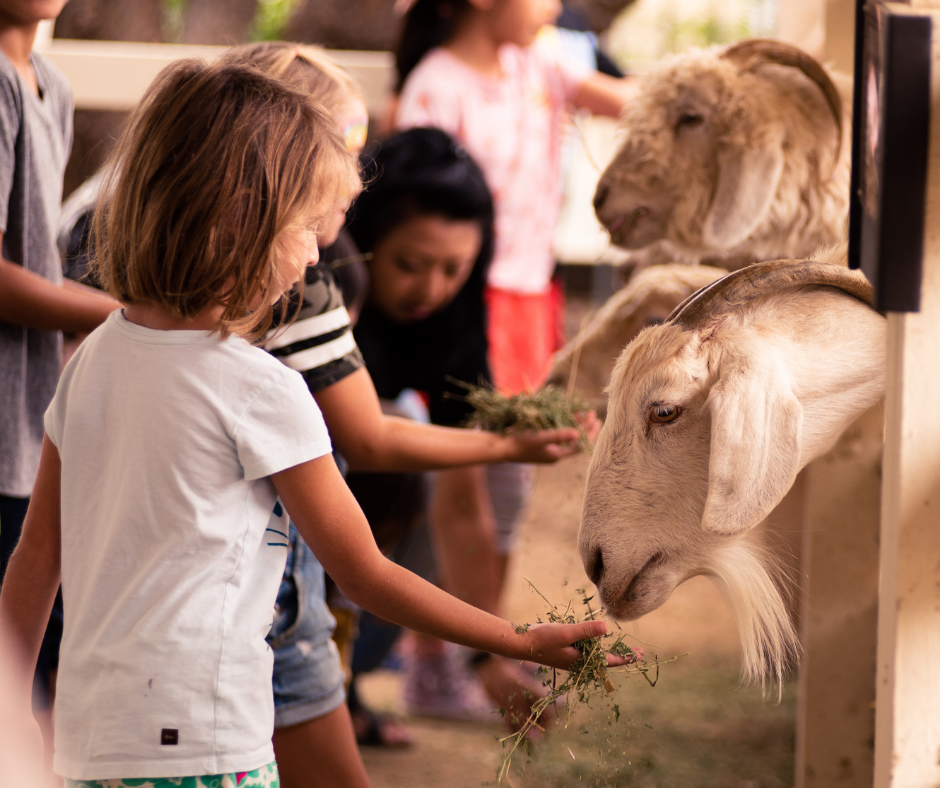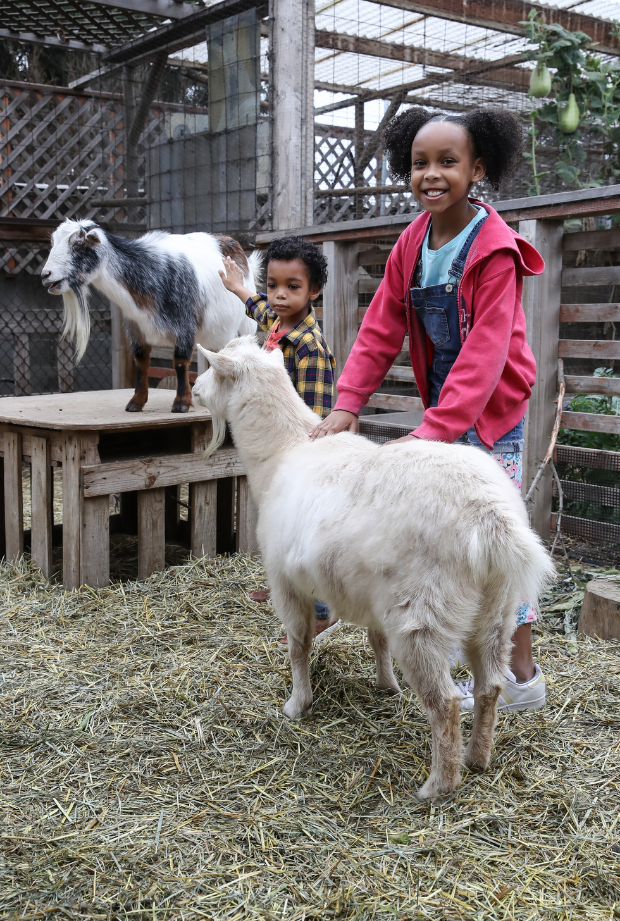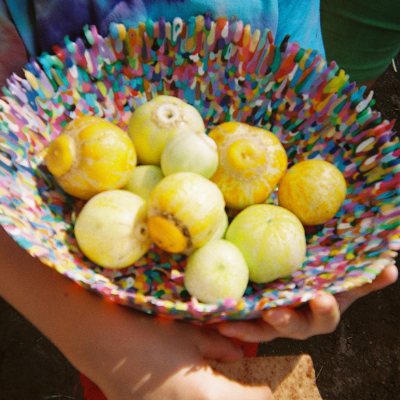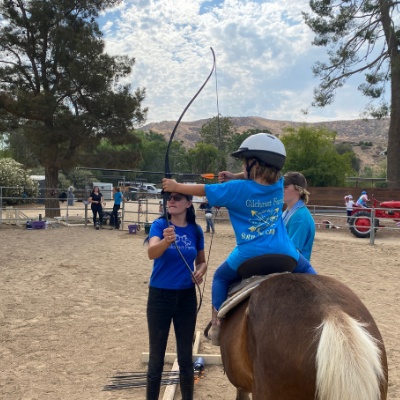
PHOTO COURTESY LEONIS ADOBE MUSEUM
Give me city or give me rural. Dirt or grit. I love the city — its gleaming towers and, especially, its graffitied guts where a kaleidoscope of cultures collide. But there’s a country girl inside me, too — a lover of starry skies and rich soil, of silence and the kind of sustenance you can pull straight out of the ground.
Urban farming marries both of these worlds, and while you won’t find Los Angeles topping any short lists for best agricultural cities, L.A. is holding its own. According to the urban farming advisory firm Agritecture, our city’s Mediterranean climate, myriad vacant lots dotting its 469 square miles and many homes with ample yards are prime ingredients for expanding farming efforts. Over the last decade, we’ve witnessed a growth in school gardens, an increase in “parkway gardeners” inspired by South L.A.’s self-proclaimed “gansta gardener” Ron Finley and proliferating produce-box companies and city foragers. COVID-19 seems to have sparked an even deeper hunger for a return to the land, a return to what’s good and true — and some local farmers are teaching the youngest among us how to cultivate and live off it.
I recently talked to a few farmers as they prepared their summer farm camp programming. Their passion for agriculture is bountiful, a passion they hope to pass to each camper they meet. Because their programming takes place outdoors, they have continued to work with children throughout the pandemic. “Kids have gotten so used to being in boxes, especially during this pandemic,” says Kathleen Blakistone, co-creator of Moonwater Farm in Compton. “They go from box to box to box. Depression is in the box. This is a chance for them to get out of the box.”
On a recent morning, my crew — photographer Jevone Moore, digital editor Nina Harada, cover models Yara and Hendrix Johnson and mom Nikea — and I got a chance to escape our own boxes and visit Moonwater Farm.
Green havens in the city
Moonwater Farm, from the street, looks like a typical house in a residential neighborhood. When we walked past the driveway entrance, though, we gasped at the lush garden of herbs, flowers and food spanning the front yard.
Blakistone heard our gushing and unlocked the gate leading to the backyard. Clad in a black Stetson and sterling silver earrings that reflect her long silver hair, she resembled a bohemian artist. Tommy, her friendly dog, rolled onto his back for belly rubs as if he knew our attention would soon be snatched by the 15,000-square-foot farm’s beauty and the exotic lure of the livestock.
Turns out, the front yard was just a tease. The backyard was a rural oasis. “It doesn’t feel like you’re in the city once you walk into the backyard,” Blakistone says. “Compton [1] is still [agricultural] in this neighborhood. Compton got a real bad rap in the ’80s, and that’s still how people think of it, but that just isn’t true. It’s been an incredible political center for Black power, for Black art, for Black culture, the Great Migration, when the majority of Black people came from Louisiana and Mississippi; and there’s a very mannered behavior that comes from those ancestral stories. You feel it when you’re here.”
A small aquaponics system lined one fence. Blakistone’s husband and Moonwater co-creator Richard Draut, a designer and builder, transformed the garage into a woodworking shop. A long, unvarnished farm table stretched under a pergola with a chandelier hanging from it. It was easy to imagine the table set with wildflowers from the gardens and plates of freshly cooked farm food that Blakistone told me the campers learn to prepare each summer. A pond gurgled with fish. From the roof of the golden Spanish-style house where Blakistone and Draut live, a large sculpture, “Flying Man,” created by Venice artist William Attaway, appears to be, well, flying.
We kept strolling (and oohing and ahhing) and found nooks and crannies filled with artwork, artifacts, rabbits and enchanting seating areas (including a swing). A chicken and rooster scuttled throughout the grounds. At the rear of the property was a goat stable. Our shoes pushed against beds of hay as sharp, earthy scents jolt our nostrils awake. Crowing roosters filled our ears. Goats galore stopped to greet us.
It took the children, especially 4-year-old Hendrix, a little while to warm to the goats, whose faces jutted into our personal space, erasing our boundaries. The goats, named after revolutionaries (Huey P. Newton, Bunchy Carter, Marsha P. Johnson and Toypurina, a Tongva resistance fighter), sniffed the photographer and his camera. A couple of goats who couldn’t bear being left out jumped on stands with the children and posed for photographs, too.
Watching his sister sink her fingers into a goat’s thick coat, Hendrix began to follow suit. His forced smile eased into a natural one. And when Blakistone handed him a fresh chicken egg, that smile broke into a full-on grin.
Blakistone grinned, too. This was what she and her husband wanted when they decided to turn their original idea of an aquaponics farm into a space to welcome and educate children about healthy food growing and eating — and to inspire food justice activism throughout the community.
What a cowboy friend told them “really made us take a left turn and realize we need real people, not lettuce,” Blakistone says. I wound up doing a master’s in regenerative studies and really shifted our whole idea. It was transformational on a personal and professional level.
“My husband’s a very talented builder and has spent the last 10 years building out the property, and said at one point, ‘Look, if we’re gonna do this, we can’t be driving in from another location. So, we sold our other home [in Venice] and relocated here,” she says. “We want to undo notions of private property. What does it look like to share resources and find partners that are born and raised in Compton and Inglewood and work together and uplift their stories and help each other?”
After running a summer camp for five years, the couple last year partnered with Camp Journeys, co-founded by educators Andrea Mozelle-Collins and Té Youman, to run their summer program. “Last year with Camp Journeys was the biggest, brightest, most economical year we ever had,” Blakistone says.
This summer, Moonwater Farm’s camp will run from July 5-29. Each week offers a different theme, including discovering week for kids 5-8 and youth leadership skills for kids 13 and older. Other offers on the farm cover lessons in food and culture (and a chance to work with local chefs), urban ranching and science, technology, engineering, art and math (STEAM). Each day starts and ends with a check-in circle and includes yoga and arts and crafts in addition to grooming the animals and picking and preparing fruit and vegetables.
Youman, who has taught middle and high school students, says the farm as classroom opens up a deeper sense of creativity and agency in the children. “I think the unconventional classroom of an urban farm allows the kids to come out of their shells and be themselves,” she says.
With all the talk about protecting the environment, campers start holding the adults accountable. “They started to notice when the compost garden wasn’t out there,” she says. “You’ve never seen so many children so happy to see worms. It gives them permission to do this kind of work at home, to teach their parents.”
Depending on the season, you’ll find all manner of bounty in the gardens: herbal plants, artichokes, oranges, tomatoes, eggplant, chili peppers, tomatoes, green beans, kale, chard. A mulberry tree drops its fruit each May. At lunchtime, kids have learned from and worked with local chefs to prepare everything from grilled mushrooms to goat cheese to Korean and Cuban food. They’ve dyed clothing with plants and made goat-milk paint. “The beauty of food, I think, is this sort of central space that we all come together around,” Blakistone says. “All of us eat, so we ask questions around who grew our food and what were they paid, and the same thing with their clothes — who made my clothes, and what were they paid? Did I harm the earth in the color that I chose for my clothes?”
Over in Highland Park, Emily Alford, who has a background as a farmer, and Kylie Obermeier, a cook, broke ground (with community help) on a vacant lot and started an urban farm they named Muddy Heaven Farm, which welcomed its first campers into their Sun Sprouts Summer Camp last year. A couple of months ago, however, the farmers were worried they wouldn’t have camp this year because the landlord sold the lot, which they’d taken from a barren wasteland to a space spilling over with sunflowers, vegetables, bugs and happy kids.
They reached out to their community with their dilemma and have now secured a new home — a backyard in East Hollywood — which they are cultivating now. Summer camp will take place Tuesdays and Thursdays June 14-July 7 and Tuesdays and Thursdays July 12-Aug.4. Camp is open to youth ages 5 and up.
“It was pretty remarkable to see how excited kids were, especially being in the midst of a pandemic and not getting to see each other,” Alford says of their first camp. “The value of being able to return to one place over and over again and getting to watch it change and build relationships with that place as it changes is really impactful for kids and really impactful even for me as an adult.”
Alford says they try to foster an understanding in kids that “all of these plants are alive and we can listen to them and they can tell us what they need. Same with bugs and water. We weave together the gardening and cooking and art.” Last year, the kids made tacos and dyed them with beet root powder — a big hit. At camp’s end, they published their photographs and farm reflections in a zine.
Rounding up more rural(ish) camps
Pierce College’s Fun Under the Sun Day Camp in Woodland Hills, which runs June 13-Aug. 5, has been around since summer program director Jamie Yarow-Marchis was a child, so it’s extra special to her that she gets to spend her days on the campus with kids, grades K-5, each summer. “I remember going up to the farm and seeing the animals,” she says.
While the growing camp program has moved on the other side of campus, away from the farm, counselors do take campers to see the animals. “If there’s a baby being born — usually goats, but the cows are always there, too — they’ve invited us to come over,” Yarow-Marchis says.
In Santa Clarita, Gilchrist Farm is a family-owned and -operated farm where campers get lessons in horseback riding, goat milking, egg gathering, pig brushing, soap and candle making, sheep shearing and more. A mini farm camp is available for kids 2-5 from May 31-June 3 and June 6-19. The summer farm camp for ages 5-16 is June 13-Aug. 5.
While not a farm, spending summer in stables might be the next best thing. Located in the lower Arroyo in South Pasadena, the San Pascual Stables runs spring and summer camps for ages 5-12. Summer day camp begins in June. Campers learn horsemanship, English riding and horse grooming.
Figuring out which camp option you want at Cali Camp in Topanga is a bit of an adventure itself. Luckily, there are open house dates starting this month. In addition to plenty of offerings, a foray into nature is one option. Through its nature skills program, campers learn about organic gardening, compost and native plants, as well as fire making and tending, stone tools and rope making. Also on hand is the Equestrian Wrangler Camp, where kids get English, Western and bareback lessons. Camper ages range from 6 up, depending on the program.
If all this talk about farm-fresh produce and farm animals inspires you to take a look at your own yard, there’s Crop Swap L.A.,an organization that can help you transform your yard into a microfarm. “How can we normalize Moonwater Farms in every neighborhood?” Blakistone asks. “That’s what we want to see. We don’t want this to be special.”
Alford echoes that sentiment and urges others to consider vacant lots as microfarms. “Oh my god, there are so many vacant lots,” she says. “Rather than paying property tax, you pay [smaller] agricultural tax. This is an extremely underutilized thing.”
These young farm campers might be the generation to change that.
Just a taste
ALMA Backyard Farms’ workshops for kids are just what you might want if you want to give your younger kids a taste of farm life without committing to a weeks-long program. The Peas in a Pod workshops, designed for 5- to 11-year-olds, take place 11 a.m. to 12 p.m. one Sunday a month through June at the Compton location. Each workshop is a different hands-on experience to teach children about gardening. Parents are encouraged to enjoy the farm while their kids are learning.
Likewise, The Leonis Adobe in Calabasas has a program called The Lil’ Ranchers, which will take places on Tuesday morningsfrom 9:30-11 a.m. July 12, 19, 26 and Aug. 2. Parents or caregivers must stay with their children while the kids indulge in arts and crafts, music and feeding the farm animals.
Cassandra Lane is editor-in-chief of L.A. Parent. A city slicker now, she is the descendant of farmers and loggers, and hears the call back to the land.































